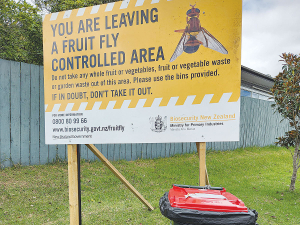Horticulture NZ Celebrates Record Year for Kiwifruit and Apples
Reflecting on the past year, Horticulture New Zealand chief executive Kate Scott says there has been a lot to celebrate.
 Special disposal bins for fruit and vegetables have now been placed throughout Zones A and B in the Birkdale area.
Special disposal bins for fruit and vegetables have now been placed throughout Zones A and B in the Birkdale area.
The quick response to the discovery of another fruit fly in Auckland is being praised by fruit and vegetable growers.
Horticulture New Zealand (HortNZ) chief executive Kate Scott says growers will likely be concerned about the discovery in Birkdale on Auckland’s North Shore.
“Growers will be concerned, as the Oriental fruit fly poses a significant risk to horticulture, with its larvae capable of feeding on more than 300 types of fruit and vegetables,” Scott told Rural News. “Home gardeners would also be affected.”
Scott says New Zealand has strong biosecurity measures in place and the quick response to the detection of this fruit fly proves the system is working.
“Vigilance, surveillance, and containment efforts remain essential to protecting the horticulture sector,” she says.
“Protecting New Zealand’s horticulture sector from biosecurity threats like the fruit fly is critical to our economy and our reputation for producing high-quality fruit and vegetables.”
Late last month, the fruit fly was discovered in a suburban backyard. It followed a similar discovery in Papatoetoe in January.
However, Mike Inglis, Biosecurity New Zealand’s commissioner, north, says that genetic testing has confirmed that – despite being the same species – these are not linked.
It’s not the first time New Zealand has experienced multiple detections like this. Back in 2019, Biosecurity New Zealand responded to fruit fly detections in three Auckland suburbs.
Upon the detection of the fruit fly, trapping in the Birkdale area increased with daily checks in the 200-metre zone surrounding the location of the original find.
Checks are also being performed in the three days in a second zone which stretches to 1,500 metres surrounding the location of the original find.
Legal controls on the movement of fruit and vegetables in Birkdale and nearby suburbs have also been put in place.
“Biosecurity New Zealand thanks the local community in Birkdale and neighbouring areas for their efforts to date and their support of the important work underway,” Inglis says.
“There has been a really positive response from local businesses and residents to the rules around the movement of fruit and vegetables,” he adds.
This marks the fourteenth fruit fly incursion in New Zealand, all of which have been eradicated so far, says MPI.
To report suspected finds of fruit fly, call MPI’s Pest and Diseases Hotline on 0800 80 99 66.
Fonterra’s impending exit from the Australian dairy industry is a major event but the story doesn’t change too much for farmers.
Expect greater collaboration between Massey University’s school of Agriculture and Environment and Ireland’s leading agriculture university, the University College of Dublin (UCD), in the future.
A partnership between Torere Macadamias Ltd and the Riddet Institute aims to unlock value from macadamia nuts while growing the next generation of Māori agribusiness researchers.
A new partnership between Dairy Women’s Network (DWN) and NZAgbiz aims to make evidence-based calf rearing practices accessible to all farm teams.
Despite some trying circumstances recently, the cherry season looks set to emerge on top of things.
Changed logos on shirts otherwise it will be business as usual when Fonterra’s consumer and related businesses are expected to change hands next month.

OPINION: Here w go: the election date is set for November 7 and the politicians are out of the gate…
OPINION: ECan data was released a few days ago showing Canterbury farmers have made “giant strides on environmental performance”.